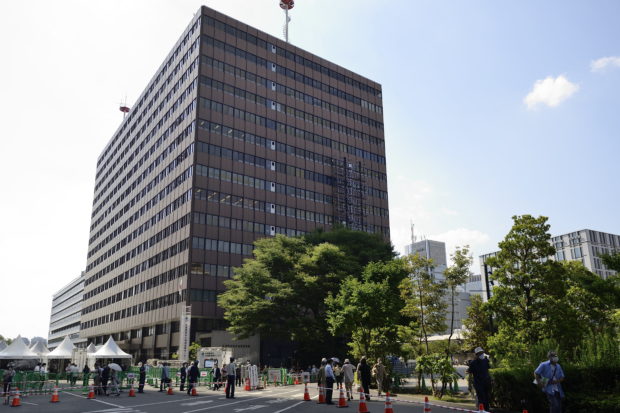Coronavirus measures set to be relaxed in Tokyo, 8 prefectures

View of the mass vaccination site in Tokyo on June 9, 2021 as Japan Self Defense Force starts a large scale inoculation for Covid-19 vaccine. AFP
TOKYO — Measures against the novel coronavirus were to be relaxed Monday in Tokyo and eight other prefectures as the state of emergency issued in those areas was to end Sunday.
Seven of the nine prefectures — Hokkaido, Tokyo, Aichi, Kyoto, Osaka, Hyogo and Fukuoka — were to transition to priority measures, under which restaurants and other eateries will continue to be asked to shorten their business hours until July 11. However, the ban on serving alcohol was to be partially lifted.
The state of emergency will remain in place for Okinawa Prefecture.
Since the beginning of this year, the Tokyo metropolitan area and the Kansai region have been placed under a state of emergency or priority measures. There were only 28 days — Jan. 1-7 and March 22 to April 11 — when Tokyo was not subject to a state of emergency or priority measures, while Osaka Prefecture had 48 such days, resulting in a prolonged impact on people’s lives.
A surge in coronavirus cases since late March, considered to be a fourth wave of infections, was caused by an outbreak of the highly contagious Alpha variant first identified in Britain. The daily number of infections newly confirmed in Japan exceeded 7,000 in early May. As the tally of seriously ill COVID-19 patients topped 1,400, which was higher than the figure logged during a third wave last winter, medical services were strained across the nation.
Article continues after this advertisementFears of 5th wave growing
The current situation greatly resembles the time when the previous state of emergency was lifted. It was followed by the fourth wave, causing some people to express concern about a resurgence in infections involving coronavirus variants such as the Delta variant, which was first discovered in India and is thought to be more infectious than the British variant.
Article continues after this advertisementMany experts point to the possibility that Japan could be hit by a fifth wave of infections from late July to August. They are calling for extreme vigilance.
The fourth wave started in the Kansai region this spring and spread nationwide.
When the previous state of emergency ended on Feb. 28 in Osaka and other prefectures, there had been concerns about the spread of the British variant. After the emergency was lifted, infections caused by this variant rapidly outnumbered those with the original form of the virus. In Osaka Prefecture, the daily count of new infections hit a record high of 1,260 on April 28, causing a serious shortage of hospital beds and overwhelming the medical system.
In random testing conducted by the Osaka prefectural government and other entities, the percentage of positive cases involving the Indian variant has been on the rise.
“We should think that infections are spreading under the surface,” said Mitsuyoshi Urashima, a professor at The Jikei University School of Medicine who specializes in preventive medicine. “Even in Britain, where many people have been vaccinated, infections have surged again because of the Indian variant. We could repeat the situation that resulted in the fourth wave.”
The fourth wave intensified around the change in the fiscal year, a time of heightened social activity. In July and August, the flow of people also tends to increase during summer vacation. Last year, the nation saw a second wave of infections during that season.
Vaccinations are the key to curbing the spread of infections. Although inoculations have progressed, especially among the elderly, less than 10% of the population has received two doses of COVID-19 vaccine.
“At present, the nation is far from herd immunity,” said Kazushi Motomura, head of the Osaka prefectural infectious disease information center. “Based on the situation in other countries, if 40 to 50% of the population is fully vaccinated with two shots, it might be effective in bringing the pandemic under control.”
For more news about the novel coronavirus click here.
What you need to know about Coronavirus.
For more information on COVID-19, call the DOH Hotline: (02) 86517800 local 1149/1150.
The Inquirer Foundation supports our healthcare frontliners and is still accepting cash donations to be deposited at Banco de Oro (BDO) current account #007960018860 or donate through PayMaya using this link.